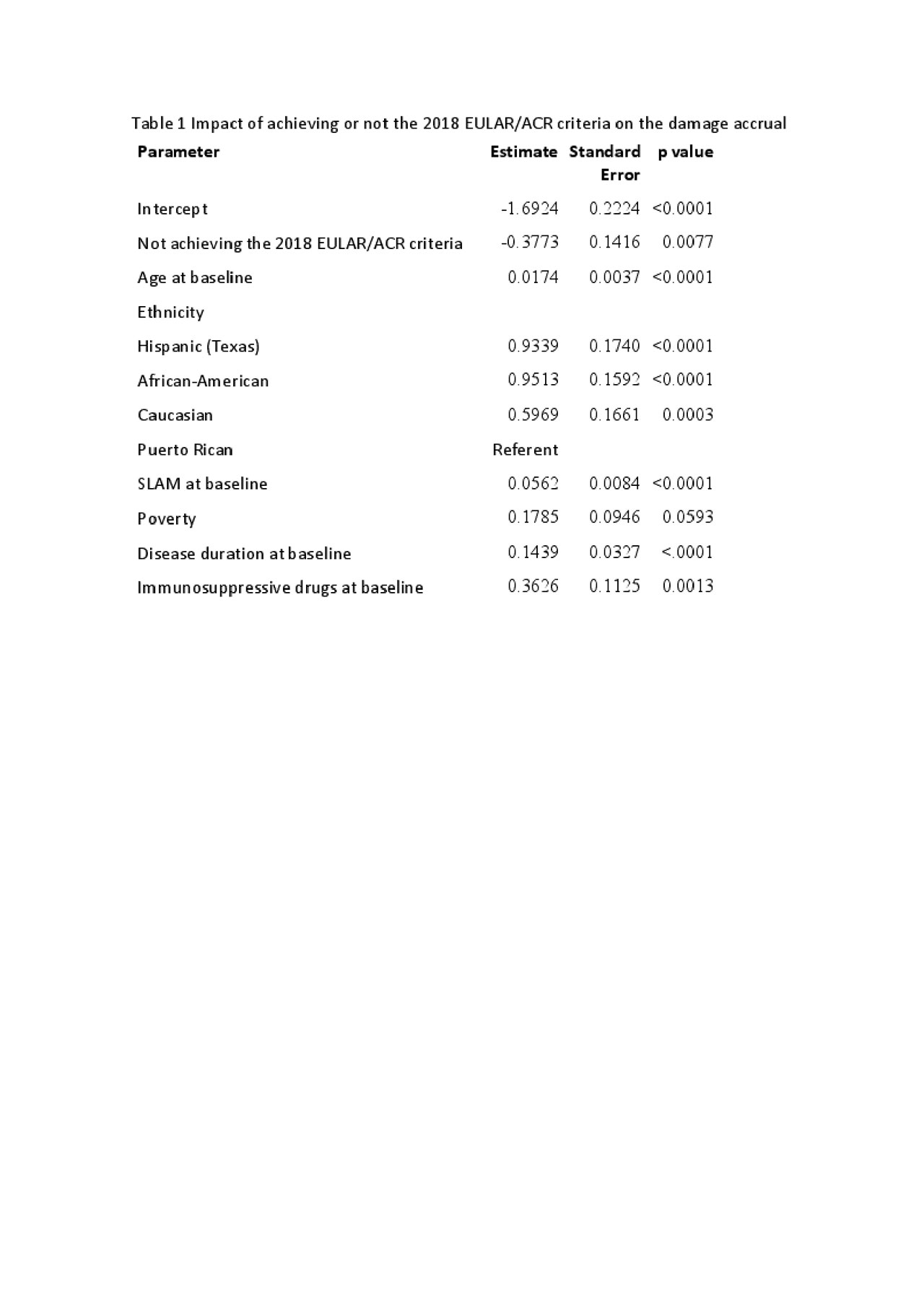Session Information
Session Type: Poster Session (Sunday)
Session Time: 9:00AM-11:00AM
Background/Purpose: The 2018 EULAR/ACR Criteria for the classification of patients with systemic lupus erythematosus (SLE) were proposed in order to improve the sensitivity and specificity of the previously published SLE criteria. In addition to its sensitivity and specificity, it is important to know if those patients who would not be classified as having SLE according to these criteria have a different prognosis than those who continue to be classified as SLE. The aim of this study was to determine the difference in damage accrual in patients who achieved or not these new criteria.
Methods: Patients from a well-defined multicenter, multiethnic US lupus cohort were included. For this cohort, SLE was defined using the 1982/1997 ACR criteria. For these analyses, we compared those patients who achieved the 2018 EULAR/ACR criteria any time during the follow-up to those who did not. The predefined outcome was the last SLICC/ACR damage index (SDI). Possible confounders included were age, gender, race/ethnicity, poverty, disease duration at baseline, baseline SLAM, baseline SDI, antimalarial, glucocorticoids and immunosuppressive drugs use at baseline. Univariable and multivariable negative binomial regression models were performed; adjustment model was based on a forward selection process. An alternative analyses was performed in order to evaluated the impact of being classified earlier, at the same time or later with the 2018 EULAR/ACR criteria.
Results: Ninety-eight out of 640 patients never achieved the 2018 EULAR/ACR criteria. The 98 patients were older and less likely to be Hispanic or African American than those who did achieve the criteria. There was no difference in mean baseline SDI among the patients who did not achieve the criteria (0.6±1.2) compared to those who achieved the criteria (0.8 ± 1.2, p=0.3580). Conversely, the mean SDI at last visit was lower for those who never achieved the criteria (1.2±1.7 vs. 2.0±2.3, p=0.0004). In the final adjusted model (Table 1), the SDI score at last visit was 31% lower for those not achieving the criteria (p=0.0077). There were not differences on damage accrual if the patients were classified earlier, at the same time or later with the 2018 EULAR/ACR criteria (data not shown).
Conclusion: In our cohort, those who did not achieve the 2018 EULAR/ACR criteria accrued less damage, suggesting that these criteria could allow us to identify a subset of patients with more severe disease than previous criteria.

Table 1 Impact of achieving or not the 2018 EULAR
To cite this abstract in AMA style:
Ugarte-Gil M, Pons-Estel G, Vilá L, Griffin R, Alarcón G. Patients Who Do Not Fulfill the 2018 EULAR/ACR Criteria for Systemic Lupus Erythematosus Accrue Less Damage: Data from a Multicenter, Multiethnic US Cohort [abstract]. Arthritis Rheumatol. 2019; 71 (suppl 10). https://acrabstracts.org/abstract/patients-who-do-not-fulfill-the-2018-eular-acr-criteria-for-systemic-lupus-erythematosus-accrue-less-damage-data-from-a-multicenter-multiethnic-us-cohort/. Accessed .« Back to 2019 ACR/ARP Annual Meeting
ACR Meeting Abstracts - https://acrabstracts.org/abstract/patients-who-do-not-fulfill-the-2018-eular-acr-criteria-for-systemic-lupus-erythematosus-accrue-less-damage-data-from-a-multicenter-multiethnic-us-cohort/
